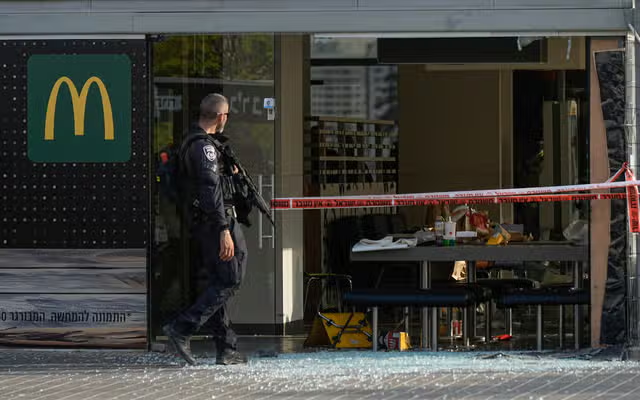Rigged pagers carried by members of Lebanon-based Hezbollah had a "sinister feature" largely overlooked in the aftermath of the explosions last month, according to a new report.
The exploding pagers featured two-step de-encryption that meant most of the users would be holding the devices with both hands when they detonated, The Washington Post reported on Saturday.
International onlookers were left stunned in mid-September when pagers used by the militant group and influential political force Hezbollah simultaneously exploded. Blasts were also reported in Syria.
The following day, similar-sized walkie-talkies also carried by members of the Iran-backed organization exploded, in what appeared to be a follow-up to the extraordinary operation blamed on Israel's Mossad intelligence service. Israel has not publicly confirmed its involvement.
Dozens of people were killed, including at least two children, when the hand-held devices detonated across two consecutive days.
Citing a combination of Middle Eastern, Israeli and U.S. officials, The Post reported that up to 3,000 Hezbollah operatives and members were killed or injured.
Tehran's ambassador to Beirut, Mojtaba Amini, lost one eye and sustained severe damage to his other eye when a pager on his person exploded, The New York Times reported, citing two anonymous members of Iran's Revolutionary Guards Corps.
Explosives 'Virtually Undetectable'
The pagers—weighing around three ounces— each contained a "tiny amount of a powerful explosive," The Post reported, citing officials familiar with the operation. The explosive was "virtually undetectable" in a battery pack, even when the device was dissembled, according to the report.
Hezbollah took apart a number of the devices, The Post reported, citing Israeli officials, adding that the pagers may even have passed X-ray examinations.
Israel is now around a week into a ground incursion into southern Lebanon after nearly a year of regularly exchanging fire with Hezbollah, which has been attacking the north of Israel in what it described as solidarity with Hamas.
Reports have suggested the designing and planting of the pagers among Hezbollah's ranks had been in the works for far longer.
Hezbollah and Israel have exchanged fire over Israel's northern border for nearly a year, after the Iran-backed group said it was acting in solidarity with Palestinian militant organization Hamas.
Hamas, designated a terror organization by the U.S., launched unprecedented attacks on southern Israel on October 7, 2023, killing around 1,200 people with approximately 250 people taken hostage in Hamas-controlled Gaza.
Israel declared war on Hamas following the attack, with ground operations and intensive airstrikes devastating the Palestinian territory. Humanitarian organizations have consistently rung alarm bells over the fate of roughly 2 million Gazans, many of whom they say have been repeatedly displaced with little to no access to vital resources.
Hamas-run health authorities in Gaza said more than 41,000 people had been killed in the strip since Israel vowed to eradicate Hamas after the October attacks.
Recent weeks brought fresh attention to the north of Israel and south of Lebanon. Israel said it was launching "limited, localized and targeted ground raids" into southern Lebanon on October 1, in what it dubbed "Operation Northern Arrows."
United Nations Secretary General António Guterres told reporters shortly after the pagers exploded that "the logic of making all these devices explode is to do it as a preemptive strike before a major military operation."
Israeli airstrikes have been happening across Lebanon, including in the southern suburbs of the capital.
Israel killed Hezbollah chief Hassan Nasrallah more than a week ago after attacking Beirut's southern outskirts. On Saturday, Reuters, citing a Lebanese security source, reported that Nasrallah's likely successor, Hashem Safieddine, had been out of touch since Friday after an Israeli strike.
The Israeli Defense Forces said on Sunday that its air force had carried out "a series of targeted strikes" on what it described as Hezbollah weapons storage sites and "infrastructure" around Beirut.
Eyewitnesses told Reuters that "massive consecutive strikes" rocked the south of Beirut in the early hours of Sunday. Lebanon's National News Agency reported "more than 30" strikes on southern suburbs, in what it called the "most violent night" since the start of Israeli operations.
Disclaimer: The copyright of this article belongs to the original author. Reposting this article is solely for the purpose of information dissemination and does not constitute any investment advice. If there is any infringement, please contact us immediately. We will make corrections or deletions as necessary. Thank you.



